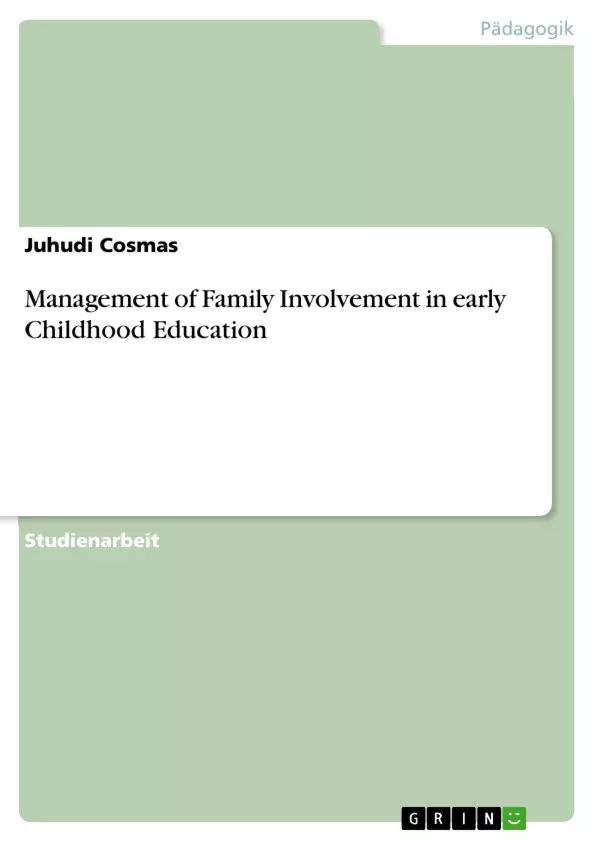Management of family involvement in the early childhood education is important because early childhood years are the period during which children acquire the basic skills that serve as the foundation for later learning, and social and cognitive development. Moreover, these years are the time when families’ beliefs about their children’s abilities are shaped and when children’s own academic self-concepts begin to form. Therefore, management of family involvement in the early childhood education matters for young children’s cognitive and social development, and learning. The ultimate goal of management at any level of education is the attainment of children’s learning and holistic children development. Therefore, early childhood education should be structured and managed in such a way that family members are involved to facilitate children’s holistic development and learning. That is, the early childhood context should be supportive and effective for family involvement in the early childhood education to enable children acquire appropriate social and cognitive skills. It should be noted that management of early childhood education is a critical issue as it involves golden age of intellectual curiosity and development of the children. Family is the major component for children growth and
development in all aspects it interacts with children throughout their life. The research studies link effective family involvement in early childhood education with good children’s outcomes. Children’s outcomes are likely to include social competence, cognitive development, communication skills, literacy development, vocabulary growth, expressive language, comprehension skills and positive engagement with peers, adults, and learning. Therefore, this work supports the ideas that decision to invest in family support and education services is an effective way to promote early childhood learning. Family needs strong support and education programs that improve their involvement in children's early learning experiences at home and that connect families to important community services. In addition, these efforts also require that schools are ready to meet each child's needs and continue to maximize opportunities to engage families in their children's education and well-being in preschools and beyond.
Inhaltsverzeichnis
- Introduction
- Importance of Early Childhood Education
- Family Involvement in Early Childhood Education
- Complementary Learning in Early Childhood Education
- The Role of Parents in Early Childhood Education
Zielsetzung und Themenschwerpunkte
Diese Arbeit befasst sich mit der Bedeutung und dem Management der familiären Beteiligung an der frühkindlichen Bildung. Der Fokus liegt auf der Analyse des Einflusses der Familie auf die kognitive, soziale und emotionale Entwicklung von Kindern.
- Der Einfluss der frühen Bildung auf die Entwicklung von Kindern
- Die Rolle der Familie bei der Förderung der frühen Bildung
- Das Konzept des komplementären Lernens in der frühen Bildung
- Die Bedeutung der elterlichen Unterstützung im Bildungsprozess
Zusammenfassung der Kapitel
Introduction
Dieses Kapitel führt in die Bedeutung der familiären Beteiligung an der frühkindlichen Bildung ein und betont den Einfluss dieser Beteiligung auf die Entwicklung und das Lernen von Kindern.
Importance of Early Childhood Education
Dieses Kapitel befasst sich mit der Bedeutung der frühkindlichen Bildung und stellt die Vorteile hervor, die sie für alle Kinder bietet. Die Rolle der Familie in diesem Prozess wird hervorgehoben.
Family Involvement in Early Childhood Education
Dieser Abschnitt erörtert verschiedene Formen der familiären Beteiligung an der Bildung von Kindern, wie z.B. die Mitarbeit zu Hause, den Besuch von Schulaktivitäten und die Kommunikation zwischen Eltern und Lehrern.
Complementary Learning in Early Childhood Education
Dieses Kapitel erläutert das Konzept des komplementären Lernens, das eine ganzheitliche Herangehensweise an die Bildung von Kindern durch die Integration von Schul- und außerschulischen Unterstützungsmöglichkeiten betont.
Schlüsselwörter
Die Arbeit konzentriert sich auf die Themen der frühkindlichen Bildung, familiäre Beteiligung, komplementäres Lernen, elterliche Unterstützung und die Förderung der kindlichen Entwicklung.
Häufig gestellte Fragen
Warum ist die Beteiligung der Familie an der frühen Bildung so wichtig?
Die frühen Jahre legen den Grundstein für späteres Lernen sowie die soziale und kognitive Entwicklung. Die Überzeugungen der Eltern prägen das akademische Selbstkonzept des Kindes.
Was bedeutet "komplementäres Lernen"?
Es ist eine ganzheitliche Herangehensweise, bei der schulisches Lernen und außerschulische Unterstützung (z.B. durch die Familie oder die Gemeinde) integriert werden.
Welche positiven Ergebnisse hat die Einbindung der Eltern?
Studien zeigen eine höhere soziale Kompetenz, bessere Kommunikationsfähigkeiten, schnellere Sprachentwicklung und ein positiveres Engagement gegenüber Gleichaltrigen.
Wie können Schulen Familien besser unterstützen?
Durch Programme, die Eltern helfen, Lernerfahrungen zu Hause zu fördern, und durch eine offene Kommunikation zwischen Lehrkräften und Erziehungsberechtigten.
Was ist das Ziel des Managements frühkindlicher Bildung?
Das Hauptziel ist die Erreichung einer ganzheitlichen kindlichen Entwicklung durch eine Struktur, die Familienmitglieder aktiv einbezieht.
- Arbeit zitieren
- Juhudi Cosmas (Autor:in), 2012, Management of Family Involvement in early Childhood Education, München, GRIN Verlag, https://www.grin.com/document/193677



